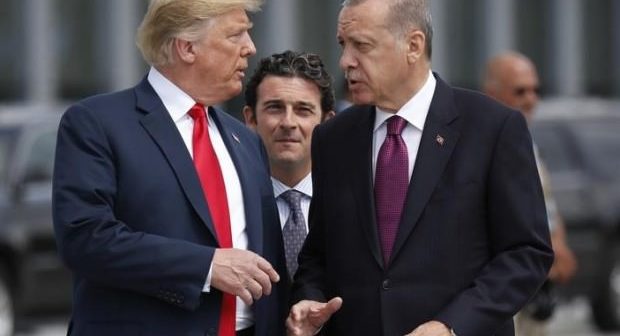
President Hassan Rouhani had called the JCPOA a “golden page” in his country’s history, opening a new chapter in Iran’s engagement with the world. It was hoped that the deal would end decades of hostile relations between Tehran and Washington.
With President Trump that “golden page” has unfortunately turned into a fond memory. With the IAEA regularly reporting that Iran is abiding by its commitments under the JCPOA, the P4+Germany and the international community, with the exception of Israel and US’ Gulf allies, still support the deal. Washington’s reneging on its commitments under the JCPOA will no doubt lead to questions regarding the consistency of US foreign policy. But equally if not more important will be dealing with Mr Trump’s threat that “anyone doing business with Iran will NOT be doing business with the United States”, despite the fact that these new sanctions are not endorsed by the UN.
Iran sanctions will further burden the Turkey-US relationship.
When the Cold War was over, Turkey found itself in the middle of three major conflict areas, the Balkans, the Caucasus and the Middle East.
The disintegration of Yugoslavia adversely affected Turkey’s trade, transport and communication links with Europe. Thousands of Bosnian refugees came over.
Instability in the Caucasus, the Armenian-Azerbaijani conflict and Georgia’s war with Russia also created problems for Turkey.
Iraq’s invasion of Kuwait in 1990 had the most severe consequences for Turkey’s security, trade and economic relations with Iraq and the Gulf region. The pipeline carrying Iraqi oil to Turkey remained closed for years. Turkey was second to Iraq in paying a high price for the sanctions targeting Saddam Hussein’s regime. These were at least UN sanctions but this did not make them any fairer for Turkey. Now with more than three million Syrian refugees, it is only understandable that Ankara would not wish to go through such an experience again this time with unilateral US sanctions targeting Iran and Washington should understand this.
Countries engage in trade with their neighbors because this serves mutual interests, encourages interdependence and brings stability. Canada and Mexico rank second and third among Washington’s major trading partners after China. Interdependence is of greater significance in the conflict-ridden Middle East than in the peaceful Americas.
Turkey and the US are NATO allies. Despite ups and down they have managed a stable relationship for decades. They have survived the removal of Jupiter missiles from Turkey in April 1963 following the Cuban crisis and the US arms embargo imposed in 1975 following Turkey’s Cyprus intervention. This embargo lasted three years.
One may say that today Turkish-American relations are at a lower point than the years of the arms embargo.
Former US assistant secretary of state Philip Gordon published an article in the Financial Times on October 10, 2017. He confirmed the foregoing. He said:
“At the start of the Obama administration, when I took over the Europe portfolio at the state department, one of the brightest spots on the foreign policy horizon was Turkey. Here was a majority Muslim country with a dynamic and popular leader that was reforming its growing economy, expanding press freedoms and easing the once-repressive military establishment out of politics.
“It was eagerly pursuing EU membership and co-operating closely with the US and EU on Afghanistan, Iraq and Middle East peace. So hopeful was Barack Obama that success in Turkey could help demonstrate that it was possible for a Middle Eastern country to be Muslim, democratic and pro-western that he insisted on adding stops in Istanbul and Ankara to his first foreign trip. He told the Turkish parliament that the US and Turkey could build a “model partnership.”
The exemption Washington recognized to Turkey on buying Iranian oil expires on May 2. It seems that new waiver extensions are not in the cards and Ankara’s Obama-bashing no longer wins points.
The fundamental problem not only between Ankara and Washington but also between Ankara and the West is overarching bad chemistry. As a matter of fact, our relations not only with the US but also many of our traditional allies are in shambles. This is because consecutive Justice and Development Party (JDP) governments in the last decade have managed to turn Turkey into an unappealing partner by leaving the democratic path, by their support to controversial Islamic groups, by their endless and aggressive rhetoric and by their disregard for conventional diplomacy.
The JDP leadership says that a submissive Turkey is a thing of the past. Yet, they cannot explain how that submissive Turkey defied the West and the Soviet Union by intervening in Cyprus in 1974. Appallingly, they strike parallels between limited incursions into northern Syria and the War of Independence fought under Ataturk’s leadership.
Is a broad Turkish-American “deal” possible? Perhaps, but while this might be an attractive approach for dealmakers in Ankara and Washington, it would not be a proper title for a relationship between long-time allies. What they should do is to have meaningful rounds of substantive diplomatic negotiations to reach mutually acceptable if not totally satisfactory solutions on their own merits.
Turkey-US tensions and JDP government’s ebb-and-flow rhetoric has done much damage to Washington’s public image in Turkey. The Trump White House must see that punishing Turkey for importing Iranian oil will further darken that image because the people of Turkey will feel the impact at a time of economic distress. This will not be a good investment in the future of the Turkish-American relationship if its survival in the long-term is still of significance to Washington.
Ali Tuygan, Ambassador (Ret’d) and former Undersecretary of the Turkish Foreign Ministry. The article is also published on his blog.









